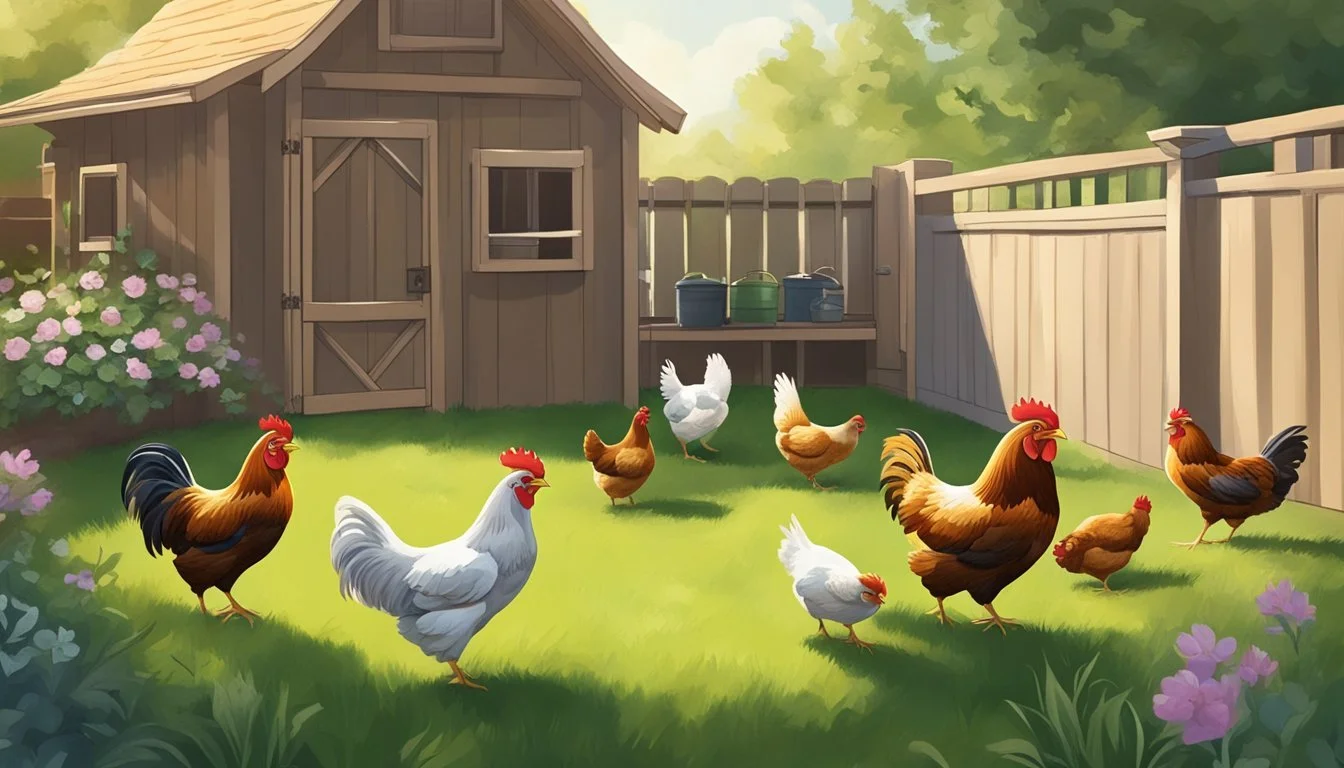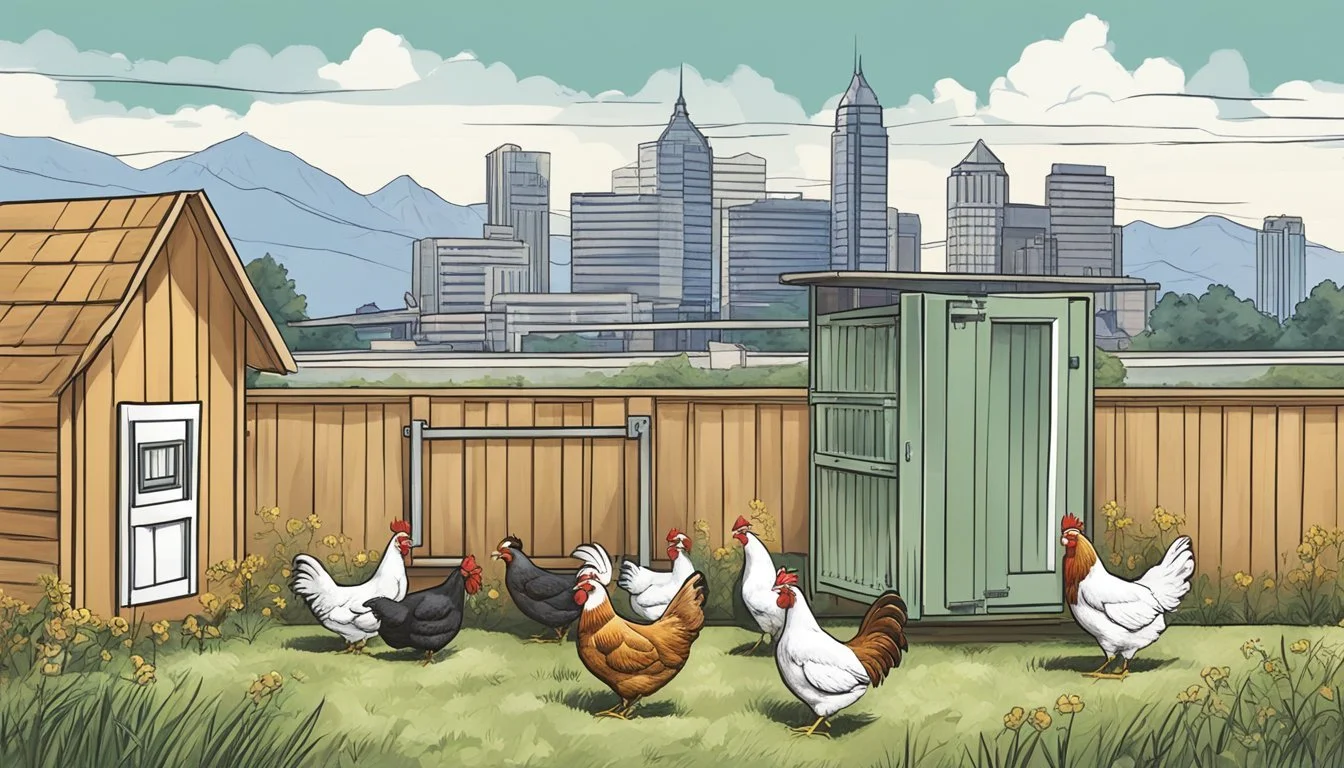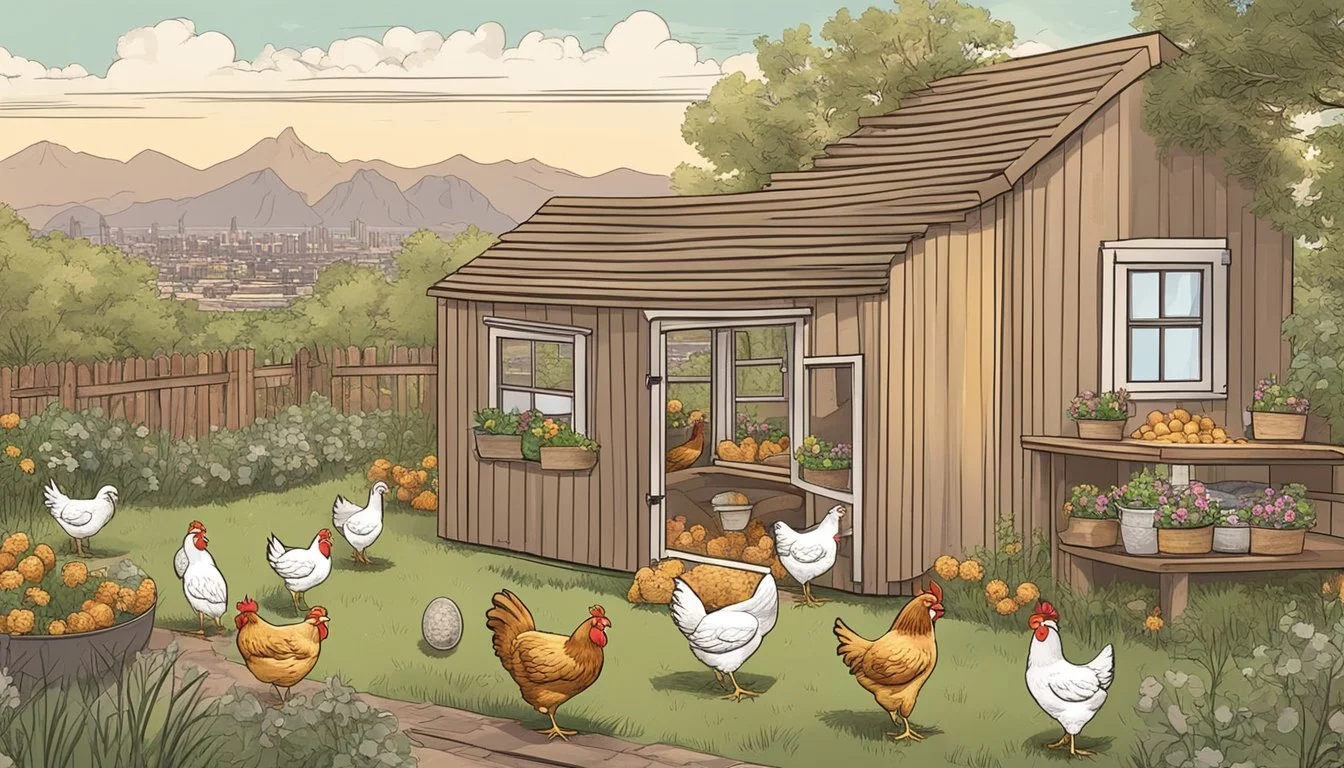Keeping Backyard Chickens in Salt Lake City, UT
A Practical Guide to Urban Poultry Farming
Keeping backyard chickens has become an increasingly popular practice for residents seeking a taste of self-sufficient living within an urban environment like Salt Lake City, Utah. With the growing trend of producing homegrown food, many are turning to raise chickens as a source of fresh eggs and as an educational experience for families. Salt Lake City accommodates this movement towards urban agriculture by allowing residents to keep chickens under certain conditions, blending a piece of rural living with the conveniences of city life.
In Salt Lake City, the local ordinances have been crafted to ensure that backyard chicken keeping does not disturb the community while enabling residents to enjoy the benefits of raising poultry. Permits are required for keeping chickens, and the city stipulates a cap on the number of birds to prevent overcrowding and ensure proper care. The city's regulations are also designed to keep the chicken coops sanitary and secure, which benefits both the chickens and the neighboring community.
The rules for keeping backyard chickens in Salt Lake City are straightforward and aim to balance the interests of urban chicken enthusiasts with those of the community at large. They establish a maximum number of 15 chickens per residential lot, prohibit the keeping of roosters to avoid noise issues, and dictate specific space requirements for coops and runs. These regulations help to maintain a harmonious relationship between chicken keepers and their neighbors, ensuring that the animals are kept in conditions that are both humane and neighborhood-friendly.
Understanding Local Ordinances
Keeping backyard chickens in Salt Lake City involves understanding and adhering to specific local ordinances. Homeowners must secure a permit, limit the amount of chickens, and comply with coop specifications.
Salt Lake City Chicken Ordinances
Salt Lake City has clear ordinances governing the keeping of chickens in residential areas. No roosters are allowed, and homeowners can have a maximum of 15 chickens. Each chicken must have adequate space; the animal welfare must be considered in the coop design and maintenance.
Permit Requirements
It is mandatory to obtain a permit from Salt Lake County Animal Services before owning backyard chickens. The permit fee is $50 and is the same irrespective of the number of chickens kept. This permit is a critical step and ensures that the keeping of chickens aligns with local health and safety standards.
Coop Restrictions
The coop for the chickens must be secure and enclosed to protect the birds and maintain sanitary conditions. A minimum area is mandated based on whether the chickens are let out:
2 square feet per chicken if allowed outside of the coop.
6 square feet per chicken if they are contained within the coop at all times.
The coop area must be kept neat and sanitary according to Section 8.08.070 of the city ordinances.
Setting Up Your Chicken Coop
Setting up a proper chicken coop entails choosing an ideal location, adhering to size and design specifics, and ensuring robust protection against predators. This will provide a safe and comfortable environment for backyard chickens in Salt Lake City, UT.
Choosing the Right Location
The chosen location for a chicken coop on a residential lot must meet local regulations. Ideally, it should be positioned in the rear yard where it benefits from natural light without causing inconvenience to neighbors. The area should be well-drained to avoid moisture buildup that can lead to unsanitary conditions.
Coop Size and Design
Chickens require adequate space for wellness and egg production. Salt Lake City regulations stipulate a minimum of two square feet per chicken inside the coop and six square feet in the enclosed chicken run if they are not free-ranging. There are design considerations too; a coop must be properly ventilated, constructed with quality materials, and include a place for straw nesting. The design can range from simple to elaborate, incorporating color and style to complement the dwelling.
Protecting Against Predators
Constructing a predator-proof coop and pen is essential. Extending the wire mesh below ground as a 'skirt' around the perimeter can prevent digging predators like foxes and dogs. Additionally, the coop should have a secure door that closes firmly, potentially with an automatic door opener to safeguard the chickens at night.
Caring for Your Chickens
Effective care for backyard chickens in Salt Lake City centers on proper feeding, clean water, and ongoing health checks. These elements are critical for maintaining a healthy, productive flock.
Feeding and Nutrition
Chickens require a balanced diet to stay healthy and produce eggs. Owners should provide a mix of commercial poultry feed, which is specially formulated to contain the necessary nutrients and vitamins. Chickens also benefit from having access to grit, which aids in digestion. For adult chickens, the following feeding guidelines can be useful:
Layer pellets: A primary source of nutrients, it should be available at all times.
Grit: Offer a small container filled with grit that chickens can consume as needed.
Additionally, occasional treats like vegetables and fruits can be offered, but should not exceed 10% of their overall diet to avoid nutrient imbalance.
Water Supply and Cleaning
Hydration is crucial for chickens, and water containers must be available, clean, and filled with fresh water at all times. Containers should be cleaned regularly—at least once every two days—to prevent the growth of algae and the spread of diseases. During winter months, special care should be taken to ensure that the water does not freeze.
Health and Wellness Checks
Regular health checks are vital to prevent and catch diseases early. A chicken's physical appearance can be telling; feathers should be smooth and eyes clear. Some key points for routine checks include:
Physical abnormalities: Inspect for lumps, wounds, or changes in behavior.
Parasites: Look for signs of mites, lice, and other parasites, especially around the vent and under the wings.
Vaccinations can also play a role in preventing certain diseases. It's important for owners to familiarize themselves with common chicken illnesses and their symptoms, enabling prompt action if health issues arise.
Egg Production and Collection
In Salt Lake City, backyard chicken keepers can maximize their hens' egg production through understanding the laying cycle, optimizing egg quality, and proper handling and storage of the eggs.
Understanding the Laying Cycle
Chickens have a natural laying cycle that can be influenced by factors such as daylight and nutrition. On average, a hen will lay one egg every 24 to 26 hours, but this can vary depending on the breed. During the shorter days of the year, particularly in northern Utah, egg production may decrease as chickens naturally lay fewer eggs with less daylight. Backyard chicken keepers can counteract this seasonal effect by providing a stable light source in the coop to maintain a consistent laying cycle throughout the year.
Optimizing Egg Quality
The quality of eggs from backyard hens is contingent upon the diet and health of the chickens. To ensure eggs are rich in nutrients like beta carotene and omega-3 fatty acids, a diet of high-quality feed supplemented with fresh greens and vegetables is ideal. Chickens also require consistent access to fresh water and calcium sources, such as oyster shell, to produce strong eggshells and maintain overall health.
Handling and Storing Eggs
After eggs are laid, they should be collected daily. Eggs are coated with a natural protective layer called the "bloom" that helps keep out bacteria. To preserve this layer, avoid washing the eggs until just before use. Eggs should be stored in a refrigerator at a temperature below 40 degrees Fahrenheit (4 degrees Celsius), ideally in the main compartment rather than the door to maintain a consistent temperature. They can be safely consumed up to 5 weeks after the collection date if stored properly.
Local Resources and Support
Salt Lake City provides a variety of resources and support for residents interested in keeping backyard chickens. This support includes permits from Salt Lake County Animal Services, assistance from local poultry clubs, and education through community-based workshops.
Salt Lake County Animal Services
Residents must obtain a permit from Salt Lake County Animal Services to keep backyard chickens. The current fee for the permit is $50, which is a flat rate regardless of the number of chickens owned, with a maximum of 15 chickens allowed and no roosters. For detailed and up-to-date information, they can be contacted directly, ensuring compliance with local regulations.
Local Poultry Clubs
Local poultry clubs offer invaluable support for both novice and experienced chicken keepers in Salt Lake City. These clubs often provide networking opportunities, shared knowledge on best practices, and advice on sustainable poultry farming. Joining a poultry club can be beneficial for anyone looking to deepen their understanding of caring for chickens.
Education and Workshops
Regularly scheduled education and workshops by various local entities help to further community knowledge about keeping chickens. These events cover a range of topics from coop construction to chicken health and are designed to equip poultry owners with the necessary skills to successfully raise their chickens throughout the seasons, including the cold Utah winters.
Residents looking to keep backyard chickens should make use of these structured educational resources to ensure their flock thrives.
Additional Considerations
When keeping backyard chickens in Salt Lake City, owners should account for waste management, maintain proper community relations, and understand regulations regarding the sale of eggs to ensure a harmonious and lawful backyard poultry experience.
Managing Waste and Odors
Proper waste management is crucial to keeping a neat and sanitary environment for backyard chickens. Coop bedding should be changed regularly to prevent the buildup of manure, which can cause unpleasant odors and attract pests. Composting chicken waste can be an effective method, as it transforms waste into valuable fertilizer for gardens. Regular cleaning schedules are essential to maintain sanitary conditions, thus, reducing the risk of diseases among the poultry.
Community Relations and Etiquette
Good community relations are vital when raising backyard chickens. Owners should ensure their chicken coops are constructed and placed in a manner that minimizes disturbances to neighbors. This includes controlling noise and preventing any waste from affecting surrounding properties. Being considerate of neighbors’ comfort can help avoid complaints and maintain a friendly atmosphere.
Regulations on Selling Eggs
When considering the commercial production of eggs, Salt Lake City residents must adhere to specific regulations. Selling eggs may require additional permits and compliance with food safety standards. Residents should acquire more information from Salt Lake County Animal Services about the legal requirements and possible restrictions that affect the sale of eggs. Failing to comply with these regulations can result in fines or other legal consequences.
Keeping chickens in urban settings like Salt Lake City involves more than just providing shelter and food. It encompasses a range of considerations that ensure the health and well-being of the chickens themselves, the cleanliness of their living area, and the relationships with the surrounding community. Moreover, those looking into the commercial aspects, such as the sale of eggs, must be diligent in understanding and following local regulations.
Related Municipal Ordinances
In Salt Lake City, residential chicken-keeping is regulated by specific municipal ordinances which vary in nearby cities like Orem, Provo, and West Valley City. These ordinances aim to ensure public health and safety while allowing residents the benefits of backyard fowl.
Orem and Provo Chicken Laws
Orem:
Maximum Chickens Allowed: Regulations permit up to six hens per residential lot.
Roosters Allowed: No, roosters are not allowed within Orem city limits to prevent noise disturbances.
Location Restrictions: Coops must be placed at least 30 feet away from neighboring dwellings.
Provo:
Maximum Chickens Allowed: Provo residents can keep a maximum of 15 hens.
Roosters: Roosters are prohibited to maintain a noise-friendly environment in residential areas.
Municipal Code: Provo requires residents to adhere to its keeping-of-animals ordinance, ensuring sanitary conditions and appropriate care for the chickens.
West Valley City Guidelines
Maximum Chickens Allowed: West Valley City allows up to 5 chickens per residence, focusing on maintaining suburban tranquility.
Roosters: Similar to Orem and Provo, West Valley City disallows roosters within its jurisdiction.
State Regulation: Utah Department of Agriculture and Food oversees the health regulations for poultry within the state, including West Valley City.
Spacing Requirements: All fowl housing in West Valley City must maintain a distance of 50 feet from any residential structure on an adjacent property.








